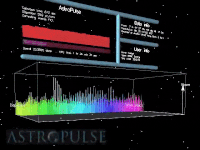Astropulse

Astropulse is a special type of computer program that helps scientists search for signals from outer space. Scientists believe that there may be other forms of life in the universe, and one way to find them is to listen for signals that might be coming from other planets or stars. But these signals are very hard to detect because they are very weak and there is a lot of background noise in space.
That's where astropulse comes in. It helps scientists analyze huge amounts of data from telescopes and other instruments that are scanning the heavens. Astropulse is like a big ear that can pick up faint signals that might be coming from other planets or stars. But it's also very selective - it can distinguish between random noise and real signals.
To do this, astropulse uses complex algorithms that are designed to pick up patterns in the data. These patterns might indicate the presence of a signal that is different from random noise. Astropulse looks for these patterns in large datasets, like a giant puzzle. It takes a lot of computing power to do this - more than any one computer could handle.
That's why scientists rely on volunteers to help them process the data. Special software is distributed to thousands of computers around the world. These computers work together to analyze the data, piece by piece. Each computer works on a small part of the puzzle, and then sends the results back to scientists.
This process is called distributed computing, and it allows astropulse to look at a lot of data quickly and efficiently. This is important because there is so much data to process. Scientists want to be able to search for signals in as much data as possible, so they can increase their chances of finding something meaningful.
Overall, astropulse is a powerful tool that helps scientists search for signals from outer space. It's like a big ear that can pick up faint signals from other planets or stars. By analyzing huge amounts of data, astropulse can help scientists identify patterns that might be signs of life beyond Earth.
That's where astropulse comes in. It helps scientists analyze huge amounts of data from telescopes and other instruments that are scanning the heavens. Astropulse is like a big ear that can pick up faint signals that might be coming from other planets or stars. But it's also very selective - it can distinguish between random noise and real signals.
To do this, astropulse uses complex algorithms that are designed to pick up patterns in the data. These patterns might indicate the presence of a signal that is different from random noise. Astropulse looks for these patterns in large datasets, like a giant puzzle. It takes a lot of computing power to do this - more than any one computer could handle.
That's why scientists rely on volunteers to help them process the data. Special software is distributed to thousands of computers around the world. These computers work together to analyze the data, piece by piece. Each computer works on a small part of the puzzle, and then sends the results back to scientists.
This process is called distributed computing, and it allows astropulse to look at a lot of data quickly and efficiently. This is important because there is so much data to process. Scientists want to be able to search for signals in as much data as possible, so they can increase their chances of finding something meaningful.
Overall, astropulse is a powerful tool that helps scientists search for signals from outer space. It's like a big ear that can pick up faint signals from other planets or stars. By analyzing huge amounts of data, astropulse can help scientists identify patterns that might be signs of life beyond Earth.
